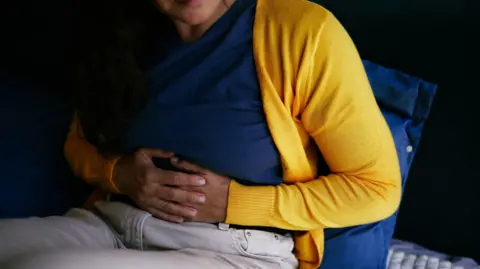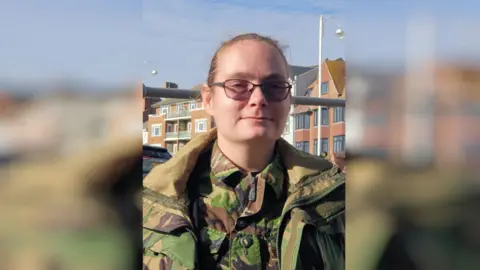
 Getty Images
Getty Images
Some people are arriving at food banks in baggy clothes due to weight loss, claims one volunteer at a foodbank
A woman working at a foodbank has told the BBC she has "got used" to people telling her they have not eaten in days.
"We see people who are thin, pale, and tired-looking," said Danny Clark, who volunteers at Hope Kitchen in Hastings, East Sussex.
"Some have clothes that are far too big for them, suggesting weight loss and no money for new clothing," she continued.
It comes as the BBC has found that soaring numbers of people are arriving at hospital either malnourished or with nutrient deficiencies.
Data obtained by Freedom of Information (FOI) request from several NHS trusts across the South East shows hospital admissions related to these two conditions in some cases doubled and nearly tripled in recent years.
Ms Clark, who has used a foodbank in the past, said many people visiting the charity were employed.
Others had health problems limiting their ability to work.
"Hunger is not something you can ignore or put out of your mind, it gnaws at your insides with increasing intensity," she continued, adding that hunger is particularly disruptive for children.
Ms Clark told the BBC people would often wait around after she had finished distributing food to see if anything was left over, though she added sometimes there was "nothing left to give".

 Danny Clark
Danny Clark
Danny Clark volunteers at a food bank in Hastings
Data obtained by FOI request from East Kent Hospitals University NHS Foundation Trust shows the number of people being admitted to hospital with either malnutrition or nutritional deficiencies increased from 2,051 in the year 2020/21 to 3,879 in 2024/25.
That's an increase of just under 90% in four years.
Cases of malnutrition or nutritional deficiencies more than doubled from 16 to around 40 at Dartford and Gravesham NHS Trust over the same period.
The BBC also found the number of patients with malnutrition or rickets - typically caused by an insufficient diet or lack of sunlight, according to the NHS – increased by nearly 45% in three years at the University Hospitals NHS Foundation Trust.
The trust, which runs several hospitals in East and West Sussex, saw 950 patients with these conditions in the year 2024/25 compared with 658 in 2021/22.
Cases of malnutrition or nutrient deficiencies at the Royal Surrey NHS Foundation Trust almost tripled from 132 in the financial year 2020/21 to 370 in 2024/25.
'Symptom of wider problems'
According to Rebecca McManamon, a spokesperson for the British Dietetic Association, a "number of factors" are driving this rise.
One "huge problem", she told the BBC, is the cost of food has risen significantly in recent years.
Food prices increased by around 37% in the five years to July 2025, according to inflation data.
More expensive food can mean that not only do people eat less, but it also pushes them towards ultra-processed foods that are often "a lot cheaper" than healthier alternatives, Ms McManamon added.
But the consultant dietitian said another problem was an ageing population, meaning more people were struggling to feed themselves properly or access nutritious food due to chronic illness or mobility issues, for instance.
Malnutrition is a "symptom of wider problems," she said, adding that a legacy of the Covid-19 pandemic is that people are also less likely to pick up on others' problems as they were not socialising as much.
Malnutrition or nutrient deficiency cases at both the East Sussex Healthcare NHS Trust and Frimley Health NHS Foundation Trust in Surrey fell between 2020/21 and 24/25.
Other trusts from across the South East could not provide data as they do not hold such information, often due to the nature of the care they provide.

 Movie
Movie 3 weeks ago
60
3 weeks ago
60 




![Presidents Day Weekend Car Sales [2021 Edition] Presidents Day Weekend Car Sales [2021 Edition]](https://www.findthebestcarprice.com/wp-content/uploads/Presidents-Day-Weekend-car-sales.jpg)




 English (United States)
English (United States)